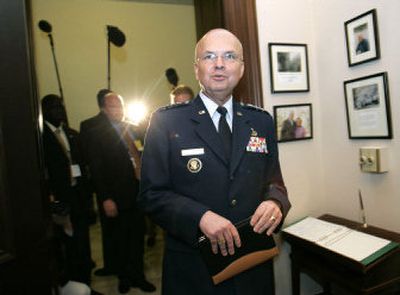Senate panel endorses Hayden

WASHINGTON – Air Force Gen. Michael Hayden won a bipartisan endorsement from the Senate intelligence committee Tuesday to head the CIA at a time of reorganization and troubled morale, and legislative leaders said they hope to have the full Senate confirm him for the job by Thursday.
The panel voted 12 to 3 to recommend that Hayden, a four-star general with substantial experience in electronic surveillance, succeed Porter Goss, who leaves the CIA post on Friday after 18 stormy months.
Hayden won the backing of the committee’s eight Republicans and four of seven Democrats. Those voting against him were Democrats Evan Bayh of Indiana, Russell Feingold of Wisconsin and Ron Wyden of Oregon.
They objected mainly to what they called the administration’s failure to justify adequately the National Security Agency’s warrantless wiretaps of Americans’ international calls. Hayden headed the NSA when the program was launched, soon after the Sept. 11, 2001, attacks.
“My vote was an objection to the administration’s unwillingness to ensure both our physical security and our civil liberties,” Bayh said. “We should not be forced to choose.”
Wyden said he also believes that Hayden misled Congress by suggesting the eavesdropping program – revealed by the New York Times in December – was the full extent of the highly secret domestic surveillance operation. USA Today recently reported that the NSA also collected millions of phone records from U.S. businesses and homes.
But the panel’s other four Democrats expressed confidence in Hayden. Sen. Carl Levin of Michigan, after citing erroneous estimates of Iraq’s weaponry that preceded the 2003 U.S. invasion, told reporters he believes Hayden will “stand up to the president or anybody else who’s trying to get him to reach a certain conclusion on the intelligence, and speak truth to power.”
Levin joined other senators in saying that Hayden, despite his military status, will protect the CIA against power plays by the Pentagon.
“He stood up to Secretary (of Defense Donald H.) Rumsfeld when Secretary Rumsfeld wanted certain intelligence components to stay with the Department of Defense,” Levin said.